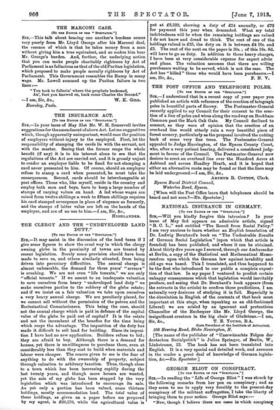THE CLERGY AND THE "UNDEVELOPED LAND DUTY."
[To THE EDITOR OP THE " SPECTATOR."] SIR,—It may assist in the discussion of the land taxes if I give some figures to show the cruel way in which the clergy owning glebe in the proximity of towns are treated by recent legislation. Surely some provision should have been made to save us, and others similarly situated, from being driven into pecuniary difficulties. The annual charge is almost unbearable, the demand for three years' " arrears " is crushing. We are not even "life tenants," we are only "official tenants." If we assent to an inadequate valuation to save ourselves from heavy " undeveloped land duty " we make ourselves parties to the robbery of the glebe estate; and if we insist on a fair valuation we take upon ourselves a very heavy annual charge. We are peculiarly placed, for we cannot sell without the permission of the patron and the Ecclesiastical Commissioners. This being the case, should not the annual charge which is paid in defence of the capital value of the glebe be paid out of capital P It is the estate and not the incumbent of the benefice for the time being which reaps the advantage. The imposition of the duty has made it difficult to sell land for building. Since its imposi- tion I have had no new application. Builders refuse to bid ; they are afraid to buy. Although there is a demand for houses, yet there is unwillingness to purchase them, even at considerably less than they cost to build when materials and labour were cheaper. The reason given to me is the fear of anything to do with the ownership of property, subject through valuation to arbitrary taxation. Thus, though close to a town which has been increasing rapidly during the last twenty years, and though more houses are wanted, yet the sale of my glebe has been stopped by the very legislation which was introduced to encourage its sale. As yet only a portion has been valued, some thirteen holdings, mostly accommodation land. The total value of these holdings, as given on a paper before me prepared by my agent, is £20,270, while the agricultural value is
put at £8,520, showing a duty of £24 annually, or £72 for payment this year when demanded. What my total indebtedness will be when the remaining holdings are valued I do not know and dread to think. The rent of one of the holdings valued is £25, the duty on it is between £4 10s. and £5. The rent of the next on the paper is 30s. ; of this 18s. 6d. will have to go as duty. In addition to these heavy charges, I have been at very considerable expense for expert advi& and plans. The valuation assumes that there are willing purchasers waiting to be served, which is not the case. The Act has " killed" those who would have been purchasers.—I














































 Previous page
Previous page